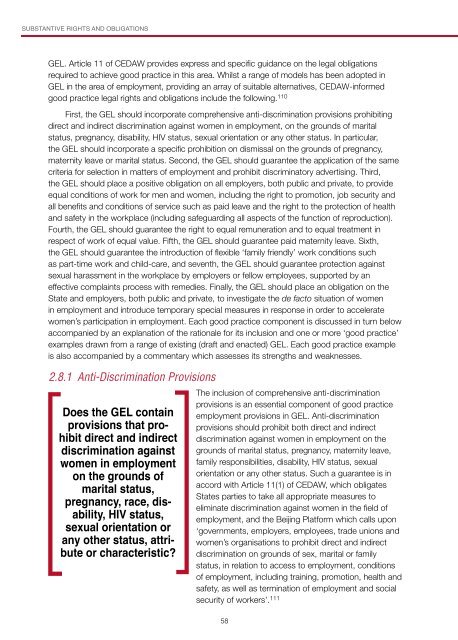Gender Equality Laws - CEDAW Southeast Asia
Gender Equality Laws - CEDAW Southeast Asia
Gender Equality Laws - CEDAW Southeast Asia
You also want an ePaper? Increase the reach of your titles
YUMPU automatically turns print PDFs into web optimized ePapers that Google loves.
SUBSTANTIVE RIGHTS AND OBLIGATIONSGEL. Article 11 of <strong>CEDAW</strong> provides express and specific guidance on the legal obligationsrequired to achieve good practice in this area. Whilst a range of models has been adopted inGEL in the area of employment, providing an array of suitable alternatives, <strong>CEDAW</strong>-informedgood practice legal rights and obligations include the following. 110First, the GEL should incorporate comprehensive anti-discrimination provisions prohibitingdirect and indirect discrimination against women in employment, on the grounds of maritalstatus, pregnancy, disability, HIV status, sexual orientation or any other status. In particular,the GEL should incorporate a specific prohibition on dismissal on the grounds of pregnancy,maternity leave or marital status. Second, the GEL should guarantee the application of the samecriteria for selection in matters of employment and prohibit discriminatory advertising. Third,the GEL should place a positive obligation on all employers, both public and private, to provideequal conditions of work for men and women, including the right to promotion, job security andall benefits and conditions of service such as paid leave and the right to the protection of healthand safety in the workplace (including safeguarding all aspects of the function of reproduction).Fourth, the GEL should guarantee the right to equal remuneration and to equal treatment inrespect of work of equal value. Fifth, the GEL should guarantee paid maternity leave. Sixth,the GEL should guarantee the introduction of flexible ‘family friendly’ work conditions suchas part-time work and child-care, and seventh, the GEL should guarantee protection againstsexual harassment in the workplace by employers or fellow employees, supported by aneffective complaints process with remedies. Finally, the GEL should place an obligation on theState and employers, both public and private, to investigate the de facto situation of womenin employment and introduce temporary special measures in response in order to acceleratewomen’s participation in employment. Each good practice component is discussed in turn belowaccompanied by an explanation of the rationale for its inclusion and one or more ‘good practice’examples drawn from a range of existing (draft and enacted) GEL. Each good practice exampleis also accompanied by a commentary which assesses its strengths and weaknesses.2.8.1 Anti-Discrimination ProvisionsDoes the GEL containprovisions that prohibitdirect and indirectdiscrimination againstwomen in employmenton the grounds ofmarital status,pregnancy, race, disability,HIV status,sexual orientation orany other status, attributeor characteristic?The inclusion of comprehensive anti-discriminationprovisions is an essential component of good practiceemployment provisions in GEL. Anti-discriminationprovisions should prohibit both direct and indirectdiscrimination against women in employment on thegrounds of marital status, pregnancy, maternity leave,family responsibilities, disability, HIV status, sexualorientation or any other status. Such a guarantee is inaccord with Article 11(1) of <strong>CEDAW</strong>, which obligatesStates parties to take all appropriate measures toeliminate discrimination against women in the field ofemployment, and the Beijing Platform which calls upon‘governments, employers, employees, trade unions andwomen’s organisations to prohibit direct and indirectdiscrimination on grounds of sex, marital or familystatus, in relation to access to employment, conditionsof employment, including training, promotion, health andsafety, as well as termination of employment and socialsecurity of workers’. 11158
















